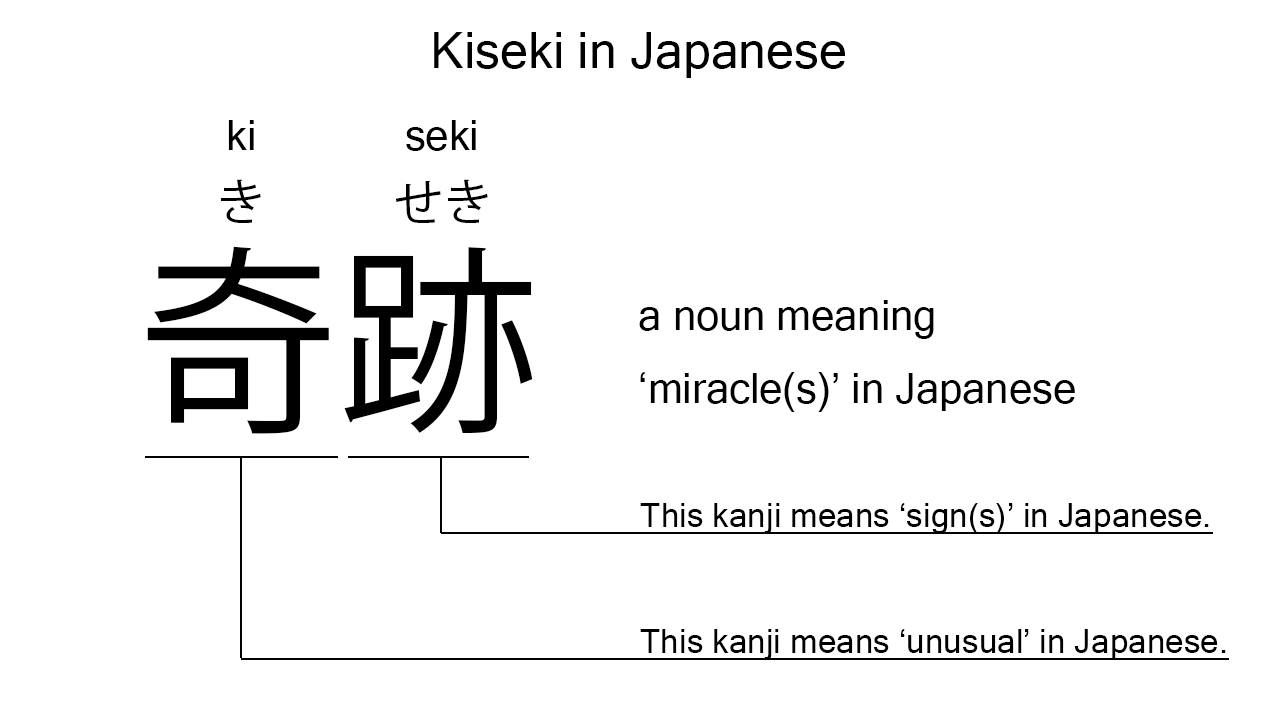What does “kiseki” mean in Japanese?
Native speakers use kiseki to mean a ‘miracle’ in Japanese. Perhaps, some Japanese learners know this word as it is sometimes used in Japanese movies, songs, novels, manga, anime, and the like. In this blog post, however, I’m explaining this word in detail based on its kanji expression. And also, I’m explaining how to use it through example sentences. My explanations would help Japanese learners understand kiseki more clearly. Then, let’s get started!
Contents
Definition and meaning of “kiseki”
Let me start with the definition and meaning of kiseki.
- kiseki – 奇跡 (きせき) : a noun meaning a ‘miracle’ in Japanese. This can also work as plural. Learn more about Japanese plural.
Native speakers use this noun to refer to an event which has a very low probability of happening. So, this Japanese noun can work in more or less the same way as the English one, miracle, I think.
The definition and meaning are simple and clear. To understand this noun more clearly, however, let me explain its kanji characters in detail, one by one.
Kiseki in kanji
The kanji expression of kiseki consists of the following two kanji characters:
- 奇 : a kanji character used to mean ‘unusual’, ‘odd’, ‘weird’, or such in Japanese.
- 跡 : a kanji character used to mean a ‘sign’, ‘trace’, ‘track’, or such in Japanese.
From these two kanji characters, we can understand that kiseki literally means ‘unusual signs’ in Japanese. This literal interpretation is not completely in line with the actual meaning, but still understandable, I think. Unusual signs sometimes hint the existence of miracles.

When we meet new kanji expressions, we should check their kanji characters in detail to understand their meanings clearly and deeply. In many cases, kanji characters tell us a lot about the meanings of the expressions they form. Actually, here, we could get the better understanding of kiseki through the detailed kanji check above.
So far, I’ve explained the definition and meaning of kiseki together with its kanji characters. Then, let me explain how to use it through the example sentences below.
How to say “miracles” in Japanese
boku tachi wa kiseki wo shinjiru – 僕達は奇跡を信じる (ぼくたちはきせきをしんじる)
We believe in miracles.
Below are the new words used in the example sentence.
- boku – 僕 (ぼく) : a pronoun meaning ‘I’ in Japanese. This is used mainly by boys and young males.
- tachi – 達 (たち) : a suffix used after a noun or pronoun to make its plural form. In the example, this is used after boku to make its plural form, boku tachi, which means ‘we’ in Japanese.
- wa – は : a binding particle working as a case marker or topic marker. In the example, this works after boku tachi to make the subject in the sentence.
- wo – を : a case particle used to make the object word in a sentence. In the example, this is used after kiseki to make the object in the sentence.
- shinjiru – 信じる (しんじる) : a verb meaning ‘to believe’ in Japanese.
This is a typical usage of kiseki. In this example, it works as a part of the commonly-used phrase, kiseki wo shinjiru, which means ‘to believe in miracles’ in Japanese.
Another example of “kiseki”
soshite kiseki ga oki ta – そして奇跡が起きた (そしてきせきがおきた)
Then, a miracle happened.
Below are the new words used in the example sentence.
- soshite – そして : a conjunction meaning ‘and’, ‘then’, or such in Japanese.
- ga – が : a case particle used to make the subject word or the object word in a sentence. In the example, this is used after kiseki to make the subject in the sentence.
- oki – 起き (おき) : one conjugation of the verb, okiru, which means ‘to happen’, ‘to occur’, or such in Japanese. In the example, it has been conjugated for the better connection with its following word.
- ta – た : an auxiliary verb used after a verb, adjective, or auxiliary verb to make its past tense form. Probably, this is well known as a part of Japanese ta form. In the example, this is used after oki to make its past tense form, oki ta.
This is another example of kiseki. In this example, it works together with the case particle, ga, to become the subject in the sentence. When we want to mean a ‘miracle’ or ‘miracles’ in Japanese, anyway, this noun is always a very good option.
Summary
In this blog post, I’ve explained the definition and meaning of kiseki in detail based on its kanji expression. And also, I’ve explained how to use it through the example sentences. Let me summarize them as follows.
- kiseki – 奇跡 (きせき) : a noun meaning a ‘miracle’ in Japanese. This can also work as plural. These two kanji characters literally mean ‘unusual signs’ in Japanese. This literal interpretation is not completely in line with the actual meaning, but still understandable, I think. Unusual signs sometimes hint the existence of miracles.
Hope my explanations are understandable and helpful for Japanese learners.
Leave a Reply